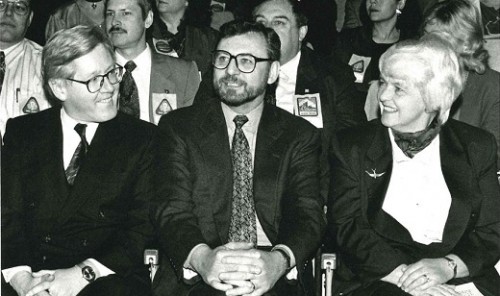
Bob Rae, former Ontario Premier; Bud Wildman, former Minister of Environment and Energy; and Ruth Grier, former Minister of Environment, at the proclamation of the Environmental Bill of Rights.
Ontario’s Environmental Bill of Rights (EBR) is a wholly original piece of legislation – a unique law driven by the aspirations of environmentalists and forged by political consensus. In February 1994, its proclamation gave the citizens of Ontario new legal tools with which to protect the environment and demand greater accountability from government decision-makers. Yet, the EBR that we know today took more than two decades to arrive at its present incarnation.
Early glimmerings
The first glimmerings came from south of the border where a 1970 bill enshrining environmental rights was passed in the Michigan Legislature. Michigan’s law inspired two reform-minded lawyers, John Swaigen and David Estrin from the Canadian Environmental Law Association (CELA), to draw up a manifesto for their 1974 landmark book, Environment on Trial. They proposed a broad set of rights for citizens ranging from environmental assessment to standing and access to information. Then, in 1979 with environment high in the polls, Stuart Smith, as Liberal opposition leader, asked CELA’s help in drafting an environmental bill of rights, which he introduced in the Ontario Legislature. His bill was the first in a series of unsuccessful attempts throughout the 1980s to pass this legislation as a private members’ bill. Both Liberal and New Democratic Party opposition members introduced versions of it on nine separate occasions, all of which were either defeated by the government in power or died on the order paper. Although none of them crystallized into legislation, Conservative and Liberal governments did pass important environmental laws, such as the Environmental Assessment Act in 1976 and the Intervenor Funding Project Act in 1988, which addressed various “rights” envisioned in the original Bill.First steps in Ontario
The Environmental Bill of Rights that was finally passed took the first step to becoming a legislative reality in 1990 when Ruth Grier became Environment Minister for the newly-elected New Democratic Party (NDP) government. The NDP had made an environmental bill of rights a key election promise, and expectations were high that Minister Grier would deliver on that promise. The Minister, who was committed to the general concept of a bill, set up a stakeholder committee made up of diverse interests to recommend the specific content. Initial attempts to decide on the legislation, however, ran into strong headwinds when the committee had difficulty coming to any agreement. As a result, the fate of the bill was uncertain. A different tack was proposed.EBR Task Force
A smaller group designated as the Task Force on the Ontario Environmental Bill of Rights was set up to resolve the contentious issues. The Task Force was made up of environmental lawyers, business representatives, and a lawyer from the government, who assumed responsibility for taking Task Force proposals back to their peers for discussion and approval. This was an innovative approach to the development of legislation and its outcome was unpredictable. The process, which has been called a principled negotiation, had been tried only once before in the development of Ontario’s class action law. Minister Grier made it clear to the Task Force that if they could not agree on a Bill of Rights, the Ministry of Environment would impose legislation that might or might not be acceptable to them. She instructed them to incorporate specific rights into their proposed legislation; at the same time they were given free rein to decide what form these rights might take. They included:- the public's right to a healthy environment;
- the enforcement of this right through improved access to the courts and/or tribunals, including an enhanced right to sue polluters;
- increased public participation in environmental decision-making by government;
- increased government responsibility and accountability for the environment;
- greater protection for employees who "blow the whistle" on polluting employers.
